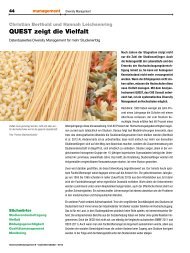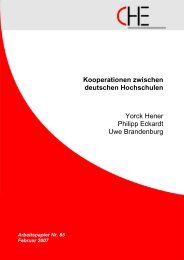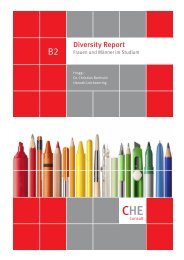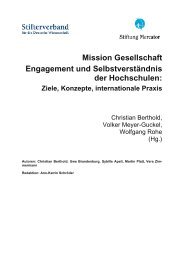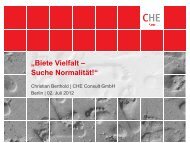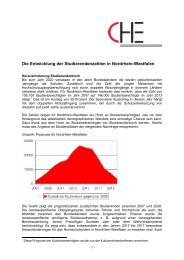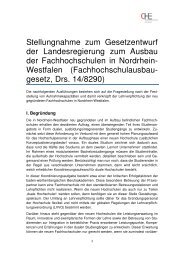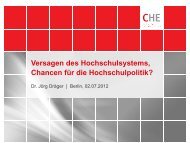Considerations in regards to the survey tool memo - CHE Consult
Considerations in regards to the survey tool memo - CHE Consult
Considerations in regards to the survey tool memo - CHE Consult
Create successful ePaper yourself
Turn your PDF publications into a flip-book with our unique Google optimized e-Paper software.
Moni<strong>to</strong>r<strong>in</strong>g Exchange Mobility Outcomes<br />
The <strong>memo</strong> <strong>to</strong>ol provides HEIs with <strong>in</strong>formation not<br />
only on <strong>the</strong>se aspects, but more importantly about<br />
<strong>the</strong> <strong>in</strong>terrelations between facts, perceptions and<br />
attitudes and how this affects <strong>the</strong> outcome of study<br />
exchange.<br />
A psychometric approach underlies <strong>the</strong> set of questions<br />
on attitudes, which are based on a research project<br />
conducted <strong>in</strong> Germany that resulted <strong>in</strong> <strong>the</strong> <strong>survey</strong><br />
<strong>to</strong>ol <strong>CHE</strong>-QUEST. This <strong>to</strong>ol covers aspects concern<strong>in</strong>g<br />
<strong>the</strong> social as well as <strong>the</strong> academic requirements<br />
of study<strong>in</strong>g (Leichsenr<strong>in</strong>g, Sippel, & Hachmeister,<br />
2011); <strong>the</strong> <strong>memo</strong> <strong>to</strong>ol is also closely related <strong>to</strong> exist<strong>in</strong>g<br />
scales used for determ<strong>in</strong><strong>in</strong>g <strong>in</strong>tercultural competency<br />
levels. These especially focus on <strong>to</strong>lerance of<br />
ambiguity, openness, <strong>the</strong> ability <strong>to</strong> <strong>in</strong>tegrate and resilience.<br />
These scales are deemed appropriate for <strong>the</strong><br />
measurement of how well <strong>the</strong> academic, social and<br />
<strong>in</strong>tercultural demands of a stay abroad were handled.<br />
1.1 Personal Aspects<br />
One aspect which shapes <strong>the</strong> situation <strong>in</strong> which <strong>the</strong><br />
student f<strong>in</strong>ds himself or herself when study<strong>in</strong>g are<br />
personal traits. For <strong>the</strong> study’s context, we focus on<br />
two major elements: The first is <strong>the</strong> <strong>in</strong>dividual emotional<br />
state, which conta<strong>in</strong>s <strong>the</strong> specific <strong>in</strong>dividual<br />
tendency but also reflects <strong>the</strong> student’s emotional<br />
reaction <strong>to</strong> <strong>the</strong> study experience. This aspect is also<br />
dependent on <strong>the</strong> <strong>in</strong>dividual state of health. The<br />
seceond element is <strong>the</strong> character trait of extroversion,<br />
which reflects an outward look<strong>in</strong>g attitude.<br />
For an <strong>in</strong>tercultural environment, two more aspects<br />
need <strong>to</strong> be taken <strong>in</strong><strong>to</strong> account: Resilience or psychological<br />
resistance. This is <strong>the</strong> ability <strong>to</strong> <strong>in</strong>ternally<br />
rebalance oneself, when faced with external disturbances,<br />
which is especially important <strong>in</strong> demand<strong>in</strong>g,<br />
stressful situations (Resilienzskala RS-25 (Leppert et<br />
al., 2002) based on (Wagnild und Young, 1993)). The<br />
second personal aspect, which comes <strong>in</strong><strong>to</strong> play <strong>in</strong> an<br />
<strong>in</strong>tercultural environment, is <strong>to</strong>lerance of ambiguity.<br />
While some people view as negative situations that<br />
are ambiguous, unstructured, below expectations,<br />
contradic<strong>to</strong>ry and unusual, o<strong>the</strong>rs perceive <strong>the</strong>m as<br />
stimulat<strong>in</strong>g (Reis, 1997). Tolerance of ambiguity is<br />
even seen as a prerequisite for <strong>in</strong>tercultural competence<br />
(Bolten, 2007).<br />
www.<strong>memo</strong>-<strong>to</strong>ol.net<br />
1.2 Social Aspects<br />
The social demands of study<strong>in</strong>g are twofold: First of<br />
all, study<strong>in</strong>g is about social <strong>in</strong>tegration, i.e. <strong>the</strong> frequency<br />
of social contacts and <strong>the</strong> satisfaction with<br />
<strong>the</strong> social aspect of <strong>the</strong> HEI’s <strong>in</strong>ternal environment as<br />
well as with <strong>the</strong> relationships <strong>to</strong> o<strong>the</strong>r people at <strong>the</strong><br />
HEI. Ano<strong>the</strong>r aspect relates <strong>to</strong> <strong>the</strong> social environment<br />
as a support structure relevant <strong>to</strong> academic success.<br />
Specifically, it comprises students’ read<strong>in</strong>ess <strong>to</strong> request<br />
help and accept help that is offered, with<strong>in</strong> as<br />
well as outside of <strong>the</strong> HEI.<br />
In an <strong>in</strong>tercultural environment, two fur<strong>the</strong>r aspects<br />
that are even more important have <strong>to</strong> be taken <strong>in</strong><strong>to</strong><br />
account: openness and sociability, s<strong>in</strong>ce <strong>the</strong>se reflect<br />
also <strong>the</strong> <strong>in</strong>terest and will<strong>in</strong>gness <strong>to</strong> repeatedly<br />
adjust <strong>to</strong> new situations and make different experiences.<br />
People differ <strong>in</strong> how far <strong>the</strong>y enjoy change,<br />
exchange and question<strong>in</strong>g <strong>the</strong> traditional or prefer <strong>to</strong><br />
stick <strong>to</strong> what <strong>the</strong>y already know and value (Borkenau<br />
& Ostendorf, 2008). Successful <strong>in</strong>ternationalisation<br />
means <strong>to</strong> ga<strong>in</strong> more openness – but experienc<strong>in</strong>g<br />
<strong>in</strong>tercultural environments might also lead <strong>to</strong> less<br />
openness. Ano<strong>the</strong>r social aspect – especially <strong>in</strong> <strong>the</strong><br />
context of a student exchange – is <strong>the</strong> ability <strong>to</strong> <strong>in</strong>tegrate,<br />
which comprises <strong>the</strong> aspects of manag<strong>in</strong>g<br />
oneself, <strong>in</strong>tegrity and team ability as well as an <strong>in</strong>terest<br />
<strong>in</strong> foreign cultures.<br />
1.3 Academic Aspects<br />
Academic aspects of study<strong>in</strong>g are, <strong>in</strong> <strong>the</strong> course of<br />
<strong>the</strong> <strong>memo</strong> project, assumed <strong>to</strong> transcend cultural<br />
aspects. While we are aware of field-specific cultural<br />
aspects, <strong>in</strong> <strong>memo</strong> we are follow<strong>in</strong>g <strong>the</strong> idea of an<br />
<strong>in</strong>ternationally similar academic culture (Parsons &<br />
Platt, 1973). Therefore, we identify three aspects <strong>to</strong><br />
be relevant <strong>to</strong> a student’s performance <strong>in</strong> academia:<br />
First of all, an <strong>in</strong>terest <strong>in</strong> <strong>the</strong>oretical approaches and<br />
frameworks and also <strong>the</strong> transfer between <strong>the</strong>ory and<br />
practice. Secondly, diligence is a necessary aspect,<br />
and comprises commitment, time management, <strong>the</strong><br />
will<strong>in</strong>gness <strong>to</strong> do someth<strong>in</strong>g as well as what is called<br />
<strong>the</strong> locus of control: The extent <strong>to</strong> which someone<br />
believes that successful performances can be achieved<br />
through one’s own efforts. Thirdly, we take <strong>in</strong><strong>to</strong><br />
account <strong>the</strong> degree of <strong>in</strong>tr<strong>in</strong>sic motivation, signify<strong>in</strong>g<br />
<strong>the</strong> will <strong>to</strong> do someth<strong>in</strong>g for oneself, because it is fun,<br />
4



